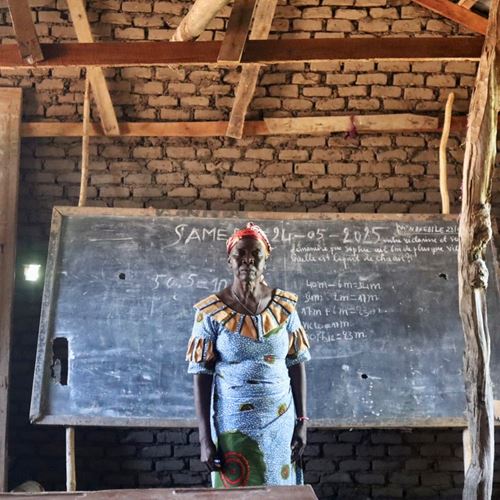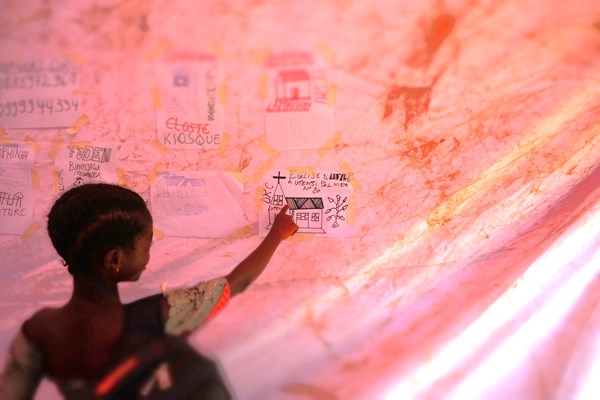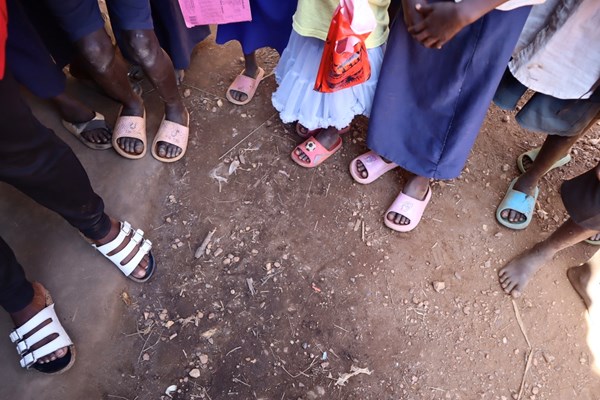Eastern DR Congo: The essential role of schools in protecting children
In Ituri, the deterioration of the security situation has led to the displacement of more than 900,000 people since January 2025. Children are among those most affected by the conflicts: the risks they face deprive them of access to their fundamental rights, whether in terms of education or protection. Since 2024, DRC has been carrying out emergency activities to respond to this situation.

Since the beginning of 2025, the conflict between armed forces and non-state groups in Ituri, in eastern DR Congo, has intensified, forcing 900,000 people, including more than 300,000 children (IOM DTM 2025), to leave their homes and seek refuge in safer places.
With more than 400 schools closed on the front line, 58,730 children (OCHA, HNRP 2025) have lost access to education in the Djugu territory. Under normal circumstances, schools provide a safe space where teachers and RECOPE can support vulnerable children. Without a school environment, they are exposed to numerous risks: forced recruitment into armed groups, gender-based violence, and dangerous work in mines or fields.
On March 24, 2025, nearly 11,000 people were forced to flee their homes in Tchomia due to conflict and found refuge in the Angumu health zone, where Danish Refugee Council (DRC) is carrying out emergency actions to support children affected by conflict with the support of DG-ECHO. Through its rapid response mechanism, DRC intervened between April and July 2025 to support 17 schools in Angumu hosting displaced children from Tchomia, including the Akicira and Uyandu schools run by Horthense and Modeste.
DRC thus intervened to provide emergency aid and enable better integration of the newly arrived students.
Displaced students facing schools without resources
The Angumu health zone is located on the border of the Djugu territory, which is a front line. It enjoys relative stability and, for this reason, many displaced persons are continually flocking there. However, living conditions there are precarious. The local school systems, which are not adapted to such a large number of students, are fragile and no longer guarantee children quality access to education.
At Akicira School, the principal describes the dire situation of displaced children and schools: "We have 130 displaced children" who have not had classes for months, "the children didn't even have backpacks to carry their belongings, they also lacked notebooks."
The principal of the Uyandu school reports similar facts, adding that "some children don't even have clothes to wear to school, while others only have one or two notebooks to take notes in." This situation limits their access to education and complicates the detection and management of protection risks.
The director of the Uyandu school has also observed numerous cases of psychological distress among displaced children in his community.
"I have observed another sign of trauma. I found a child who is mute, a child who listens but does not speak."
Other children who have been separated from their families or are unaccompanied are "victims of beatings and isolation."
These children are particularly vulnerable as they receive little or no protection from adults and are unable to look after themselves.
They "spend sleepless nights because they have nowhere suitable to sleep," which exposes them to many risks, including the risk of dropping out of school due to the lack of a parental figure to force them to go to school.
Protecting children by strengthening schools with the support of DRC
Between April and July 2025, DRC carried out emergency interventions in schools with the support of DG-ECHO in order to respond quickly to the needs of displaced children and strengthen their protection. As part of this effort, more than 3,000 school kits were distributed to students in 12 schools in Ituri, as well as teaching kits for teachers and maintenance kits for schools.
The Akicira school benefited from this aid. Following discussions with parents and teachers, DRC was able to identify the problems and thus provide financial support for the construction of two doors to rehabilitate a dilapidated classroom. In addition, DRC donated "15 desks and four boxes of paint to paint the desks. Finally, DRC built a two-room building and equipped it with 20 desks (more will arrive soon, along with other equipment)," as explained by the school principal.
DRC and RECOPE, community protection networks, have trained 95 school teachers in psychosocial support for children and teaching techniques adapted to children in difficulty. The training courses have had a strong impact, and "the teachers, for their part, want above all to continue the training to improve their teaching," says the director of Akicira.
Thanks to the training provided by DRC, teachers and RECOPE can easily identify children suffering from psychological distress and help them. Modeste explains:
"If we see something wrong, we visit the child's family and use the knowledge we gained from DRC's training to educate the family."
He explains how he managed to restore the confidence of a child who had stopped speaking:
"I started talking to him and building a relationship with him. The child now comes to class, and his closed expression has changed. The other day, I went to his house. When I got there, his mother saw me talking to him and saw him give me a thumbs up and start to smile. The psychosocial training has been very beneficial."
Thanks to the support of DG-ECHO, DRC's intervention provided an emergency response that strengthened the resilience of communities, particularly children, in the face of shocks. The director of Uyandu School emphasizes its importance:
"We have created resilience, a word we learned with DRC."

A child shows the drawing she made as part of an activity organized in one of the mobile child-friendly spaces (CFS) deployed during the activation of the Rapid Response Mechanism (RRM)
Hortense*, Principal of Akicira School
How did the NGO assist you and how did this assistance help improve the school?
DRC raised awareness through RECOPE (community child protection networks), organized a five-day training course, and distributed school kits for students and teachers, as well as teaching and maintenance kits.
With DRC, we also found that there were risks for the children. DRC therefore asked parents to build latrines. One classroom was in disrepair and DRC gave us $210 to repair it. DRC also helped us develop improvement plans: first, the NGO asked for our opinion.
What we did was produce bricks and build toilets, and DRC also helped us make doors. The NGO gave us $819 for all of this. It also gave us 15 desks and four cans of paint to paint the desks. Finally, DRC built a two-room building and equipped it with 20 desks (more will arrive soon, along with other equipment).
What was the situation like before?
Before, the children didn't even have backpacks to carry their belongings and didn't have notebooks either. We are currently hosting 130 displaced children. They and other children will benefit from remedial classes, which will begin this Monday for 160 children (editor's note: these classes began in the summer of 2025).
Have teachers also seen an improvement in the situation?
Teachers, for their part, want above all to continue their training in order to improve their teaching.

Modeste*, Director of the Uyandu School
First and foremost, I would like to thank DRC. What DRC has done has inspired us. The NGO has trained us in what we did not know, and what we did know has now been updated. We used to have a small staff, and now we are overwhelmed. We do not have enough classrooms to teach the children. We work very closely with DRC.
We also have children who have experienced a lot of traumas, and thanks to DRC training, we are able to support them and today they seem to be doing well. Some of them don't even have school uniforms, just one or two notebooks to write down their lessons.
To help children suffering from trauma, we walk around the village. If we see something wrong, we visit the child's family and use the knowledge we gained from DRC training to educate the family. We work as one. Thanks to the training we received, we have built resilience, a word we learned from DRC.
What was the situation like when the displaced students arrived? Were there any integration issues?
We noticed that some students were being bullied and isolated. When they were isolated, they found themselves in a new world, with no way of interacting with the people here. When some students are isolated, we ask them what the problem is. And I approach them using what I learned in the training, asking them, "How are you? Where are you?"
There are two or three children that I have identified who have spent a sleepless night because they have nowhere decent to sleep. When they arrive here at school, instead of listening to what the teacher is teaching, they start to doze off. That's how I came to ask the others, "Why are you sleeping?" What I found out was that friends they made here took them to collect branches to sell, and then they came home late. Their families had nothing to prepare and struggled to find food, which kept them up late.
Another day, I noticed another case of trauma. I found a mute child, a child who listens but does not speak. I started talking and building a relationship with him. The child now comes to class, and his closed expression has changed. The other day, I visited his home. When I arrived, his mother saw me talking to him, and saw him give me a thumbs up and start smiling. We benefited greatly from the psychosocial training.
- * Names have been changed